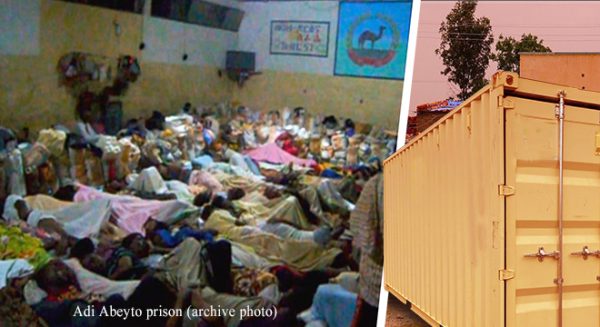Uprising Realigns Qatar, Egypt Relations With Eritrea, Ethiopia
![]() The North African uprising is having a dramatic impact on Egyptian and Qatari relationships with bitter rivals Eritrea and Ethiopia, with the latter benefiting from the new developments and Eritrea finding itself, once again, on the wrong side of the popular wave.
The North African uprising is having a dramatic impact on Egyptian and Qatari relationships with bitter rivals Eritrea and Ethiopia, with the latter benefiting from the new developments and Eritrea finding itself, once again, on the wrong side of the popular wave.
Prior to the uprising, Ethiopia regularly complained about Qatar and Egypt. In 2008, Ethiopia broke off diplomatic relations with Qatar accusing it of being “a major source of instability in the Horn of Africa.”
More recently, in an interview with awate.com, Ethiopian Prime Minister Meles Zenawi accused the Egyptian regime of having a colonial mindset with regards to the River Nile which it uses as a “political instrument” to “justify this gargantuan state, Egyptian state, which is there to protect the Egyptians vis-a-vis the Abd [slave] from the South.”
Meanwhile, the Eritrean government had excellent relations with Qatar, with the Eritrean president regularly scheduling a “working visit” to Qatar—using Qatar-donated presidential plane—to discuss “bilateral relations.” (Check here and here for “working visits” in 2011 alone.) In June 2010, Qatar also mediated the Djibouti-Eritrean border dispute of 2008, which Eritrea had been describing as a fabrication for nearly two years. (see the text of the mediation agreement, a pdf file, linked in our article here)
Similary, the Eritrean and the Hosni Mubarek regime saw eye-to-eye on ensuring that Sudan remain “united” (which ended up being a futile effort) and that Ethiopia does not have a dominant role in Somalia. Towards that end, the Eritrean strongman had close relationship with Egyptian spymaster Omar Suleiman, who had been promoted to the vice-presidency in the waning days of Hosni Mubarek. According to our sources, the upcoming report of the United Nations Sanctions Committee is going to include damning information on the government of Hosni Mubarek and its facilitation of illicit funds to Somali extremists, through Eritrea.
Qatar Changes
With the popular uprising against Libya’s Muammer Qaddafi, another friend of Isaias Afwerki, Qatar took a leadership role: it allied itself with NATO; its planes are employed in the bombing campaign against Qaddaffi, and it was one of the first nations to recognize the Bengazi-based Interim Transitional National Council. Its powerful network, Aljazeera, has been seen as the only ally to the people’s uprising, presenting an alternative to the stifling and heavily-censored state media. Many of the young revolutionaries in Egypt and Tunisia credit Aljazeera for the success of their revolution. Qatar, in short, is heavily-vested in ensuring the overthrow of the Qaddaffi regime.
In his interview with Eri-TV, Isaias Afwerki explained that questions that attempt to get to the bottom of choosing sides—with Qaddaffi or the opposition—are “childish games.”
In his interview with awate.com, Meles Zenawi explained that recognizing Libya’s “Interim Transitional National Council” is a formality: traditionally, he explained, Ethiopia doesn’t recognize governments unless the African Union does first.
Now, effective May 1, 2011, Qatar has directed its immigration authorities to deny entry to citizens of over a dozen countries, including Eritrea, who still support Libyan dictator Muammer Qaddaffi.
Egypt
An Egyptian public diplomacy delegation numbering 48 prominent personalities comprising of politicians, parliamentarians, judges, journalists and Tahrir Square Youth arrived in Addis Ababa last week and were received by Ethiopian dignitaries. The delegation, which included Abdulhakim Gemal Abdelnasser (son of former Egyptian president Gemal Abdelanasser), was accompanied to Ethiopia by Mahmoud Dirir, Ethiopia’s new ambassador to Egypt.
The subject is the so-called Renaissance Dam: Ethiopia is building a dam estimated to cost more than US$ 4.5 billion on the Nile and it insists that the dam that is is building on the West of Ethiopia close to the Sudanese border will not hurt Egypt and it will not affect the flow of water but, on the contrary, will save evaporation wastage of about 14 billion cubic meters of water.
On Saturday, after dinner, the host, Ethiopian Foreign Minister Hailemariam Desalegn and the Ethiopian ambassador to Egypt, as well as the head of the Egyptian delegation danced to celebrate the achievements of the “January 25 Revolution.” Sources also indicated that Egypt’s first post-Mubarek prime Minister, Essam Sharaf, is expected to visit Ethiopia for further talks with his Ethiopian counterpart.
The same night that the Ethiopians were partying with the Egyptians, Eritrean state TV was showing Isaias’s interview where he attempted to downplay the role of the popular uprising and credited/blamed foreign conspiracies for the development, specifically using “Fewda Khalaqa”—the Arabic phrase for “creative chaos”—for people who presumably have hijacked the revolution.
Isaias Afwerki, who lost his military and intelligence sponsor in Hosni Mubarek appears to be losing his main financial sponsor Gaddafi, and is now on the verge of losing Qatar, his diplomatic sponsor. And, historically, as goes Egypt, so goes Sudan.


Awate Forum